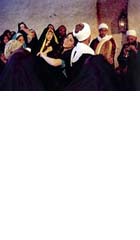
Date Wine (Arak El-Balah) 1998
Distributed by Arab Film Distribution, 10035 35th Ave. NE, Seattle, WA 98125; 206-322-0882
Produced by Marianne Khoury
Directed by Radwan El-Kashef
VHS, color, 110 min.
College - Adult
Film Studies, Media Studies, African Studies, Middle Eastern Studies
Date Entered: 12/02/2004
Reviewed by Jean O’Reilly, University of ConnecticutThis Egyptian feature film has strong elements of both folktale and comedy, although its subject matter and final scenes are anything but funny. Set in southern Egypt, the film tells the story of a group of people who are led into the desert by a strong-minded man who wants them to live far from the greed and corruption of civilized society. Years later, when the leader has become old and weak, a mysterious visitor coaxes the men of the village away to work in the north where they can make a lot of money. Only the leader and his adolescent grandson Ahmed - who has no desire for wealth - are left in the village with the women and children.
Ahmed’s only desire is to learn to climb the highest tree in the village to harvest the rare white dates, whose wine he believes will return his grandfather’s health. Being the only healthy man in the village, however, Ahmed finds himself laden with responsibility - he soon handles the mail, reads and writes letters for the women, looks after the children, defends the women’s honor, runs errands to nearby villages, becomes engaged to local beauty Salma, and generally grows up. He also becomes an initiate into the female side of life in the village. He eventually climbs the palm tree, though the resulting wine doesn’t have quite the effect he wants it to have.
When a few of the men return home, they find that Ahmed seems to have become an important part of every household. Jealous, they plot his death, sending him up the highest palm tree and then cutting it down. Once the tree has been felled, the shade-dwelling villagers find that the sun is too brutal for them and they move back to civilization. The village becomes a sun-baked ghost town, inhabited only by the grandfather’s old slave and Salma and Ahmed’s illegitimate daughter.
Date Wine is one of too few films directed by the talented Radwan El-Kashef, who died in 2002. By setting the film in the southern part of Egypt, El-Kashef lets himself step away from realistic narration and create an exotic, mythical, epic story, one that’s brought him both criticism and acclaim. His detractors tend to think Date Wine is too commercial, that its glossy look, exotic locales and costumes, and musical interludes are made to appeal to an international audience and say little about Egypt or Egyptian filmmaking. El-Kashef’s supporters regard the film as a welcome look at the often ignored and much more traditional southern Egyptian culture.
Media librarians and archivists may well want to add this title to their collections as an example of bold, colorful filmmaking from one of Egypt’s best-known modern directors.
Date Wine is in Arabic, with English subtitles.